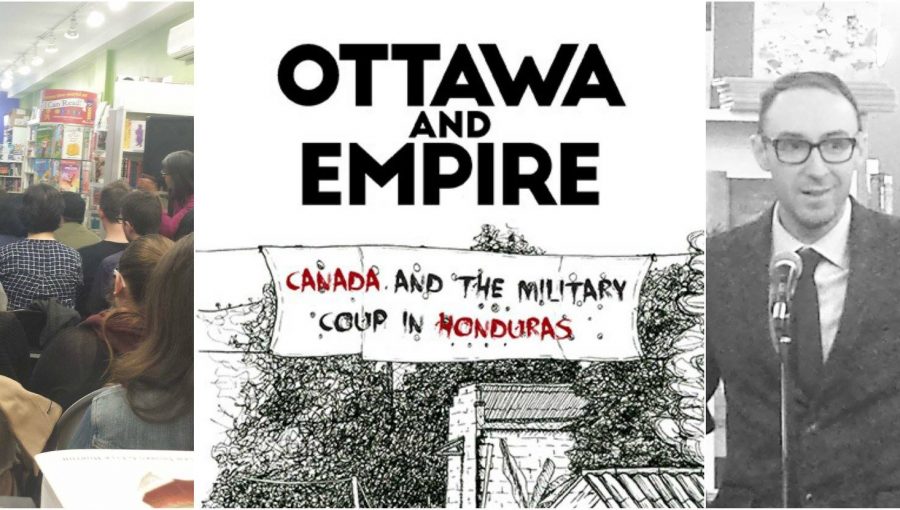Olympic Flame Parades Through Ravaged Northern British Columbia
February 2, 2010 — The Vancouver Winter Olympic torch relay is winding its way across northern British Columbia this week. It arrived in the coastal town of Kitimat yesterday. The celebration was subdued. Like most towns on the relay’s route, Kitimat is suffering huge economic blows from the barons of the natural resource industries that are the mainstay of the province’s economy.
Eurocan paper mill, the second largest industrial employer in Kitimat, announced in late October that its doors would close permanently. The torch relay arrived on the first day of that closure. Five hundred and fifty direct jobs are gone, and several hundred indirect ones. The town loses a huge piece of its industrial tax base.
Several tens of thousands of forest industry jobs have been lost across British Columbia in recent years. Compounding the closures of paper mills and sawmills are deepening cuts to government services. Recently, the closings of 14 schools in Prince George were announced, most in rural areas surrounding the city. That’s more than one third of the schools in the regional school district. Prince George is an industrial city of 80,000 located in the geographic center of the province.

These closings have sparked the most significant protests in recent years to provincial government cuts to social programs. Several hundred students and parents from the Prince George Traditional School marched to the offices of provincial education minister Pat Bell on January 25. Two days later, the first protest in the province to greet the torch relay occurred when scores of parents and students brought their concerns over school closings to its route through the city.
A Town Under Corporate Siege
Kitimat is a town of 9,000 under siege by the resource industries on which it was founded. West Fraser Timber Mills closed the Eurocan paper mill because it said the mill was not earning “enough” profit.
Townspeople fear that a similar fate awaits the largest employer in the town, the Rio Tinto (formerly Alcan) aluminum smelter. For years, that company has sought to reduce, or shut down altogether, aluminum production while continuing to run its hydro-electric facilities and earning fantastic profits. The aluminum smelter is busy for now, but its 1300 employees are pressured or obliged to work loads of overtime. An estimated 200 people could be hired at the smelter if the frenetic pace of overtime was curtailed.
Barry Pankhurst, chairperson of the surrounding Coast Mountain School District, says the Olympics Games (the “Vancouver” Games, he stresses) are leaving people in the district with very mixed feelings. “Many people are saying, ‘We support the athletes, but not the Games’.”
The town is under great pressure, he says, from the combination of factory closings and government spending cuts. The school district recently closed three schools. Five others were closed earlier. “The province has loads of money for a big party in Vancouver, but no money for schools. There’s something wrong here.”
“We Have Nothing Left to Cut.”
Pankhurst says the town feels abandoned by the provincial government. “We’ve been deserted. The simple reality is that people feel the government is not here to help us.”
He is worried for the future of the aluminum smelter. “Rio Tinto is not doing the maintenance and upgrades needed to keep the smelter efficient and competitive. It’s a rerun of what happened at Eurocan.”
What’s needed, he says, is a government like Newfoundland’s that is willing to stand up to corporate interests. Last year, the government of premier Danny Williams blocked the paper giant Abitibi Bowater from continuing to use its public license to produce and sell electricity after the company closed the paper mill for which electrical production rights were originally granted, way back in 1912. The government obliged the company to sell its electrical facilities to the province under terms it laid down. (For a full article on this, see The Bullet #179, January 14, 2009.)
Mad Scramble for Resource Industry Profits
The forest industry in British Columbia is being hammered by a combination of the collapse of the U.S. housing industry and the infestation of its pine forests by a native pine beetle.
Rising average winter temperatures and bad tree cutting practices have caused an epidemic of pine tree destruction by the beetle. Clear cutting has degraded the mix of tree species that helped keep the beetle in harmony with forest ecology, while winter temperatures are no longer cold enough to kill off larvae (several weeks of continuous temperatures of minus 20 or colder are required). The pine forests, a vital source for the sawmilling industry, have all but disappeared in the province.
The beetle has recently leaped over its traditional geographic barrier to the east, the Rocky Mountains, and is now spreading inexorably eastward across the vast northern Canadian forests.
Since it was first elected in 2001, the Liberal Party government in BC has offered the natural resources of the province to the highest bidders. A mad scramble has opened – drilling for oil and gas in the north, damming or channelling of hundreds of rivers for ‘green’ electrical production, plans for yet more coal and hard rock mines, regardless of environmental impact, and relentless clear cutting of the forests.
Coastal ocean waters have not escaped the pillage. Vastly increased numbers of salmon farms in coastal inlets as well as urban and industrial development threaten wild stocks of salmon. The salmon are also threatened by rising ocean temperatures. This year saw a catastrophic drop in the numbers of certain species of salmon returning to the spawning grounds of the Fraser River, the world’s largest salmon-spawning river.
The provincial and federal governments are quietly hinting at lifting the decades-old ban on oil and gas drilling and oil tanker traffic along BC’s coast, one of the richest and most diverse marine ecologies in the world. U.S. oil and natural gas company Apache has applied to build a $3-billion natural gas terminal in Kitimat that would service the rapidly expanding natural gas fields in northern BC and the tar sands projects in Alberta. •
The author of the following article, Dave Zirin, spoke to a well-attended public forum in Vancouver on January 20 on the subject of the Vancouver Winter Olympics. He also spoke at several colleges while in the city. He praised the efforts of those in Vancouver who are organizing against great odds to bring a message of social justice to the Olympic corporate spectacle.
As Olympics Near, People in Vancouver are Dreading Games
Dave Zirin
When I arrived in Vancouver, the first thing I noticed was the frowns.
The International Olympic Committee has leased every sign and billboard in town to broadcast Olympic joy, but they can’t purchase people’s faces. It’s clear that the 2010 Winter Games has made the mood in the bucolic coastal city decidedly overcast. Even the customs police officer checking my passport started grumbling about “$5,000 hockey tickets.” Polls released on my first day in Vancouver back up this initial impression. Only 50 percent of residents in British Columbia think the Olympics will be positive and 69 percent said too much money is being spent on the Games.
“The most striking thing in the poll is that as the Olympics get closer, British Columbians are less likely to see the Games as having a positive impact,” said Hamish Marshall, research director for the pollster, Angus Reid. “Conventional wisdom was that as we got closer to the Olympics, people here would get more excited and more supportive.” If the global recession hadn’t smacked into the planning last year, with corporate sponsors fleeing for the hills, maybe the Vancouver Olympic Committee would be on more solid ground with residents. But public bailouts of Olympic projects have decisively altered the local mood.
I spoke to Charles, a bus driver, whose good cheer diminished when I asked him about the games. “I just can’t believe I wanted this a year ago,” he said. “I voted for it in the plebiscite. But now, yes. I’m disillusioned.” This disillusion is developing as the financial burden of the Games becomes public. The original cost estimate was $660-million in public money. It’s now at an admitted $6-billion and steadily climbing. An early economic impact statement was that the games could bring in $10-billion. Price Waterhouse Coopers just released their own study showing that the total economic impact will be more like $1-billion. In addition, the Olympic Village came in $100-million over budget and had to be bailed out by the city.
Security was estimated at $175-million and the final cost will exceed $1-billion. These budget overruns are coinciding with drastic cuts to city services. On my first day in town, the cover of the local paper blared cheery news about the Games on the top flap, while a headline announcing the imminent layoff off 800 teachers was much further down the page.
As a staunch Olympic supporter, a sports reporter from the Globe and Mail said to me, “The optics of cuts in city services alongside Olympic cost overruns are to put it mildly, not good.”
But these aren’t just p.r. gaffs to Vancouver residents, particularly on the eastside of the city where homelessness has spiked. Carol Martin who works in the downtown eastside of Vancouver, the most economically impoverished area in all of Canada, made this clear: “The Bid Committee promised that not a single person would be displaced due to the Games, but there are now 3,000 homeless people sleeping on Vancouver’s streets and these people are facing increased police harassment as they try to clean the streets in the lead up to the Games.”
I strolled the backstreets of the downtown eastside and police congregate on every corner, trying to hem in a palpable frustration and anger. Anti-Olympic posters wallpaper the neighborhood, creating an alternative universe to the cheery 2010 Games displays by the airport. The Vancouver Olympic Committee has tried to quell the crackling vibe by dispersing tickets to second-tier Olympic events like the luge. It hasn’t worked.
The people of the downtown eastside and beyond are developing a different outlet for their Olympic angst. For the first time in the history of the games, a full-scale protest is being planned to welcome the athletes, tourists, and foreign dignitaries.
Bringing together a myriad of issues, Vancouver residents have put out an open call for a week of anti-game actions. Different demonstrations on issues ranging from homelessness to indigenous rights have been called. Protesters from London and Russia, site of the next two Olympics will be there. Expect a tent city, expect picket signs, expect aggressive direct actions. Tellingly, according to the latest polls, 40 percent of British Columbia residents support the aims of the protesters, compared to just 13 percent across the rest of Canada. Harsha Walia of the Olympic Resistance Network said, “We are seeing increasing resistance across the country as it becomes more visible how these Games are a big fraud.”
The Games will also coincide with the largest and longest-standing annual march in Vancouver, the Feb. 14 Memorial Women’s March meant to call attention to the hundreds of missing and murdered women – particularly indigenous women – in British Columbia. The Vancouver Olympic Committee asked the Memorial March organizing if they would change the route of the march for the Olympic Games. As Stella August, one of the organizers with the downtown eastside Power of Women Group, said to me, “We are warriors. We have been doing this for 19 years and we aren’t going to bow down to the Olympics.”
One thing is certain: if you are in Vancouver, and competitive curling doesn’t get your blood pumping, there will be quite the spectacle outside the arena. •
Dave Zirin has a website, The Edge on Sports, where this article first appeared: www.edgeofsports.com.





